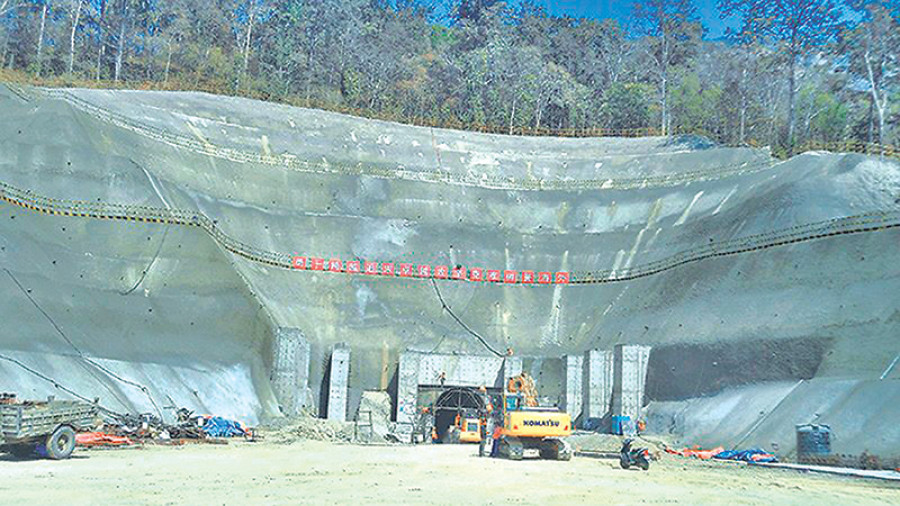Valley
‘Chinese nationals top list of expats obtaining work permits’
While thousands of Nepalis leave the country every year for job opportunities, Nepal too is attracting its reasonable share of migrant workers of late. Among the foreign nationals seeking work permits in the country, Chinese people lead the lot, with 942 of them getting work authorisation papers in the last fiscal year 2016-17.
Chandan Kumar Mandal
While thousands of Nepalis leave the country every year for job opportunities, Nepal too is attracting its reasonable share of migrant workers of late. Among the foreign nationals seeking work permits in the country, Chinese people lead the lot, with 942 of them getting work authorisation papers in the last fiscal year 2016-17.
Fifty-four women and 888 men from China had obtained work permits in the fiscal year, according to the Department of Labour (DoL).
The influx of Chinese migrant workers can be linked with the growth of Chinese investments and China-supported infrastructure projects in the recent time.
“It is evident from our data that more Chinese are coming to work because of many Chinese firms working in Nepal. They bring their experience and expertise from their country,” said Devraj Dhakal, director general of the Department of Labour (DoL).
People from the United Kingdom made the second largest foreign workers force with 52 individuals applying for work permits.
According to the data, Indians were third largest foreign workers force in the country with 38 people obtaining work permits in the fiscal year 2016-17.
“Indians come in third position if we were to consider the number of work permits. But it is not compulsory for Indians to acquire work permit in Nepal. The number of Indians working in Nepal is definitely higher than any other countries,” said Dhakal.
The numbers of other foreign nationals coming to the country to work were well below 50.
While the country has received applications for work permit from a total of 55 diverse countries in last fiscal year, the total number of new applicants was 1,324, fewer in comparison to the previous two fiscal years.
In the last five years that is since fiscal year 2012-13 to fiscal year 2016-17, a total of 7,170 non-Nepalis were granted work permit, which included both new applicants and those renewing their previously granted permits. In the fiscal year 2012-13, a total of 984 such permits were issued which slumped to 719 in following fiscal year.
The number again rose to 2,023 in the fiscal year 2014-15 before witnessing a continuous drop— 1,472 in the fiscal year 2015-16 and 1,972 in the fiscal year 2016-17.
The number of new applicants has continued to plummet from 2,019 in the fiscal year 2014-15 to 1,472 in the fiscal year 2015-16 and to 1,324 in the fiscal year 2016-17.
Last fiscal year, a record 648 foreigners renewed their work permit, whereas only four had done so in the previous four fiscal years.
Asia leads the work permit applicants with 1,584, followed by Europe (261), the United States of America (83), Australia (32) and Africa (12) in last fiscal year.
Of the total number of work permit issued, 165 are working in non-governmental organisations, 1,375 in private agencies and 432 in government agencies.
“Those given work permit for working here are involved in various sectors like INGOs, private companies, hydropower, multinational companies and some working as experts or freelance technicians,” said Dhakal. “If a certain expertise is not available in Nepal, they could be hired from overseas by announcing vacancies in media.”
In terms of manpower required for projects being implemented for government with international firms and agencies, hiring of manpower and required numbers are documented in the MoU itself, according to Nabin Pokharel, Non-Nepalese Section officer with DoL.
The department issues a maximum one year of work permit for the applicants, which can be renewed again.
It also conducts a thorough investigation of the company if it wants to hire manpower from outside the country. Later, the applicants are interviewed before granted the work permission.
“Firstly, the required labour can be hired from outside only if it’s not available here. Then, the demand should be verified by the Home Ministry. And the company should be legally operating in Nepal, with PAN registration and tax cleared,” added Pokharel.




 9.89°C Kathmandu
9.89°C Kathmandu














